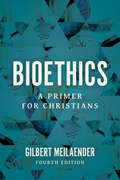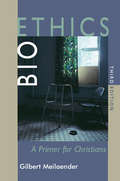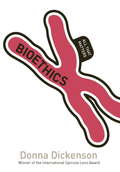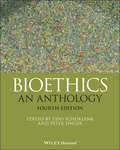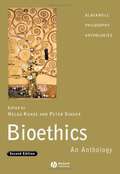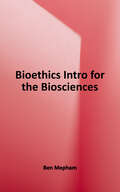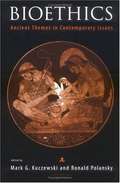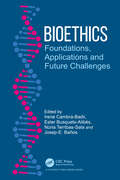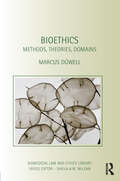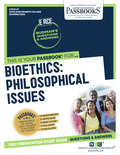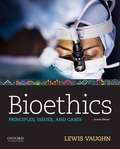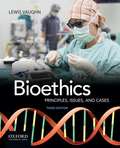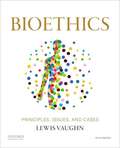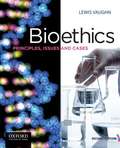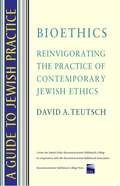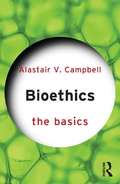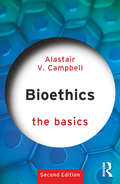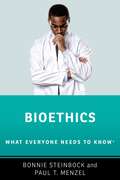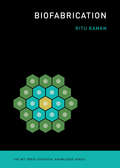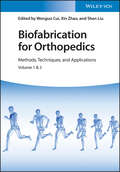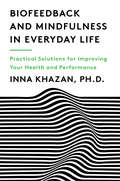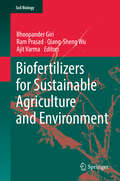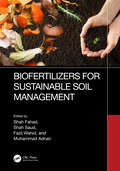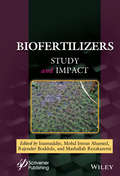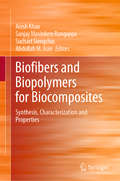- Table View
- List View
Bioethics: A Primer for Christians
by Gilbert MeilaenderAmid continuing advances in medical research and treatment, Gilbert Meilaender&’s Bioethics has long provided thoughtful guidance on many of society&’s most difficult moral problems—including abortion, assisted reproduction, genetic experimentation, euthanasia, and much more. In this fourth edition, Meilaender updates much of the data referenced in the book and responds directly to recent developments, such as the CRISPR/Cas9 method of gene editing. Christians seeking discernment in this new decade will appreciate Meilaender&’s circumspect writing and his ability to address the nuances of each issue while maintaining strong and clearly stated moral convictions.
Bioethics: A Primer for Christians, Third Edition
by Gilbert MeilaenderIn the face of continuing advances in medical research and treatment, bioethics remains a serious ongoing social concern. For nearly two decades Gilbert Meilaender’s Bioethics has offered discerning Christian guidance on a wide range of pressing issues in medical ethics. Now in its third edition, Meilaender’s Bioethics covers abortion, assisted reproduction, genetic research, suicide and euthanasia, human experimentation — and much more — in language that is theologically informed, straightforward, and clear. This new edition includes updated information throughout and an added discussion of the need to protect Christian conscience in the practice of medicine.
Bioethics: All That Matters
by Donna DickensonIn this book:Donna Dickenson - Winner of the International Spinoza Lens AwardShould we do what ever science lets us do?Bioethics: All That Matters, new developments in biotechnology like genetics, stem cell research and artificial reproduction arouse both our greatest hopes and our greatest fears. Many people invest the new biotechnology with all the aspirations and faith once accorded to religious salvation. But does everyone benefit equally from scientific progress? Commercialised modern biomedicine runs the risk of exploiting vulnerable groups, from Indian 'surrogate' mothers to professional guinea pigs in drug research. Professor Dickenson argues that although we've entered new scientific territory, there's no need to jettison our existing moral sense. By discussing a range of real-life cases, she equips readers to make up their own minds on these important and controversial questions. Good science and good ethics needn't be contradictory.This accessible and concise book will appeal to both students and general readers, giving a fascinating introduction to a wide range of perspectives on Bioethics.All That Matters books:All books in the All That Matters series are written by world experts in their subject field. These experts work to distil a topic and get right to its heart, making the book accessible for both students and general readers. Each compelling book contains new and interesting perspectives and tells stories that matter.The Author:All That Matters - Interesting introductions to important issuesBooks on the following subjects are available from the All That Matters series: Muhammad, God, Water, Political Philosophy, Sustainability, Philosophy, Intelligence, Love, Russian Revolution, War, and Creativity.To find out more visit: www.allthatmattersbooks.com
Bioethics: An Anthology (Blackwell Philosophy Anthologies #27)
by Peter Singer Udo Sch KlenkThe new edition of the classic collection of key readings in bioethics, fully updated to reflect the latest developments and main issues in the field For more than two decades, Bioethics: An Anthology has been widely regarded as the definitive single-volume compendium of seminal readings on both traditional and cutting-edge ethical issues in biology and medicine. Acclaimed for its scope and depth of coverage, this landmark work brings together compelling writings by internationally-renowned bioethicist to help readers develop a thorough understanding of the central ideas, critical issues, and current debate in the field. Now fully revised and updated, the fourth edition contains a wealth of new content on ethical questions and controversies related to the COVID-19 pandemic, advances in CRISPR gene editing technology, physician-assisted death, public health and vaccinations, transgender children, medical aid in dying, the morality of ending the lives of newborns, and much more. Throughout the new edition, carefully selected essays explore a wide range of topics and offer diverse perspectives that underscore the interdisciplinary nature of bioethical study. Edited by two of the field’s most respected scholars, Bioethics: An Anthology: Covers an unparalleled range of thematically-organized topics in a single volume Discusses recent high-profile cases, debates, and ethical issues Features three brand-new sections: Conscientious Objection, Academic Freedom and Research, and Disability Contains new essays on topics such as brain death, life and death decisions for the critically ill, experiments on humans and animals, neuroethics, and the use of drugs to ease the pain of unrequited love Includes a detailed index that allows the reader to easily find terms and topics of interest Bioethics: An Anthology, Fourth Edition remains a must-have resource for all students, lecturers, and researchers studying the ethical implications of the health-related life sciences, and an invaluable reference for doctors, nurses, and other professionals working in health care and the biomedical sciences.
Bioethics: An Anthology (Second Edition)
by Peter Singer Helga KuhseThe expanded and revised edition of Bioethics: An Anthology is a definitive one-volume collection of key primary texts for the study of bioethics. Brings together writings on a broad range of ethical issues relating such matters as reproduction, genetics, life and death, and animal experimentation. Now includes introductions to each of the sections. Features new coverage of the latest debates on hot topics such as genetic screening, the use of embryonic human stem cells, and resource allocation between patients. The selections are independent of any particular approach to bioethics. Can be used as a source book to complement A Companion to Bioethics (1999).
Bioethics: An Introduction for the Biosciences
by Ben MephamBioethical issues remain front-page news, with debate continuing to rage over issues including genetic modification, animal cloning, and 'designer babies'. With public opinion often driven by media speculation, how can we ensure that informed decisions regarding key bioethical issues are made in a reasoned, objective way? Bioethics: An Introduction for the Biosciences offers a balanced, objective introduction to the field of bioethics, ideal for any biosciences student who is new to the subject. With a focus on developing the students' power of reasoning and judgement, the book presents different perspectives to common themes in an impartial way, fostering debate and discussion. The opening section, 'The Ethical Groundwork', introduces students to the nature of bioethics and ethical theory. The book goes on to lead students through a broad range of bioethical issues relating to people, animals, and food, before concluding with an overview of bioethics in practice. The current generation of students will become the next generation of decision makers. Bioethics: An Introduction for the Biosciences is the perfect introduction to a field with which every biosciences student should be familiar. Online Resource Centre The Online Resource Centre features: For registered adopters of the book: - Figures from the book in electronic format, ready to download For students: - A web link library and hyperlinked reference list, giving ready access to additional information sources; - Topical updates: extensive summaries of the latest developments in those topics covered in the book, ensuring that the reader can remain up-to-date at all times.
Bioethics: Ancient Themes in Contemporary Issues
by Mark G. Kuczewski Ronald M. PolanskyThis collection of essays explores themes from ancient Greek philosophy and medicine and their implications for contemporary medicine and bio-medical ethics. Thus the work examines the relationship of two of the most popular areas in the current revival of ethics, namely, classical ethics and biomedical ethics--areas that have seldom been brought together in any serious or sustained way. The essays in this volume are written by established classical scholars and bioethicists.
Bioethics: Foundations, Applications and Future Challenges
by Irene Cambra-Badii Ester Busquets-Alibés Terribas-Sala Núria Josep-E. BañosThe aim of this book is to introduce and discuss bioethics in a three-synergistic way: from the foundations to the current debates in relation to healthcare and social bioethics, and thereafter the possible future challenges. In this sense, the target audience can be from diverse disciplines: life and medical sciences, law, philosophy, psychology, and education. The book will be useful to high school students, in their first contacts with bioethics, college students, teachers and researchers, and the general public interested in these controversial debates of the past, present and future of bioethics.
Bioethics: Methods, Theories, Domains (Biomedical Law and Ethics Library)
by Marcus DüwellThis book is a philosophically-oriented introduction to bioethics. It offers the reader an overview of key debates in bioethics relevant to various areas including; organ retrieval, stem cell research, justice in healthcare and issues in environmental ethics, including issues surrounding food and agriculture. The book also seeks to go beyond simply describing the issues in order to provide the reader with the methodological and theoretical tools for a more comprehensive understanding of current bioethical debates. The aim of the book is to present bioethics as an interdisciplinary field, to explore its close relation to other disciplines (such as law, life sciences, theology and philosophy), and to discuss the conditions under which bioethics can serve as an academically legitimate discipline that is at the same time relevant to society. As a systematic and methodologically rigorous overview, Bioethics: Methods, Theories and Principles will be of particular interest to academics and students in the disciplines of Law, Medicine, Ethics and Philosophy. 'This is a book that embraces neither a single ethical theory nor a pragmatic melange of just-so-principles. It is a thoughtful and engaging analysis of diverse theoretical foundations in Bioethics. It is also an enormous step towards conceptual and philosophical clarity in this fascinating area.' - Professor Christian Illies, Chair for Practical Philosophy at the Otto-Friedrich University Bamberg, Germany
Bioethics: Passbooks Study Guide (Excelsior/Regents College Examination Series)
by National Learning CorporationThe Excelsior/Regents College Examinations (E/RCE) offer you an opportunity to obtain recognition for college-level learning and consists of exams designed to demonstrate achievement and mastery of various college-level subjects, such as the Arts and Sciences, Business, Criminal Justice, Education, Health and Nursing. The E/RCE Bioethics: Philosophical Issues Passbook® prepares you by sharpening knowledge of the skills and concepts necessary to succeed on the upcoming exam and the college courses that follow. It provides a series of informational texts as well as hundreds of questions and answers in the areas that will likely be covered on your upcoming exam.
Bioethics: Principles, Issues, And Cases
by Lewis VaughnThis book explores the philosophical, medical, social, and legal aspects of key bioethical issues. Opening with a thorough introduction to ethics, bioethics, and moral reasoning, it then covers influential moral theories and the criteria for evaluating them. Integrating eighty-seven readings--ten of them new to this edition--substantive introductions to each issue, numerous classic bioethical cases, and abundant pedagogical tools, this text addresses the most provocative and controversial topics in bioethics.
Bioethics: Principles, Issues, And Cases, Third Edition
by Lewis VaughnBioethics: Principles, Issues, and Cases, Third Edition, explores the philosophical, medical, social, and legal aspects of key bioethical issues. Opening with a thorough introduction to ethics, bioethics, and moral reasoning, it then covers influential moral theories and the criteria forevaluating them. Integrating eighty-nine readings - twelve of them new to this edition - numerous classic bioethical cases, and abundant pedagogical tools, this text addresses the most provocative and controversial topics in bioethics. PEDAGOGICAL FEATURES:* "Classic Case Files" describe landmark cases that shaped the debate, while news-making "Cases for Evaluation" encourage students to form their own opinions* Various text boxes: "In Depth" boxes contain additional material, illustrations, or analyses, much of it "ripped from the headlines"; "Fact File" boxes provide statistics on the social, medical, and scientific facets of a chapter's topic; and "Legal Brief" boxes summarize important court rulingsand the status of major legislation* "Key Terms" are boldfaced and boxed off within the text and then defined in a glossary at the back of the book* "Applying Major Theories" sections at the end of each chapter help students relate theories to the issues
Bioethics: Principles, Issues, and Cases
by Lewis VaughnBioethics: Principles, Issues, and Cases explores the philosophical, medical, social, and legal aspects of key bioethical issues. Opening with a thorough introduction to ethics, bioethics, and moral reasoning, it then covers influential moral theories and the criteria for evaluating them. Integrating eighty-nine readings, numerous classic bioethical cases, and abundant pedagogical tools, this text addresses the most provocative and controversial topics in bioethics.
Bioethics: Principles, Issues, and Cases, Second Edition
by Lewis VaughnBioethics: Principles, Issues, and Cases, Second Edition, explores the philosophical, medical, social, and legal aspects of key bioethical issues. Opening with a thorough introduction to ethics, bioethics, and moral reasoning, it then covers influential moral theories and the criteria for evaluating them. Integrating eighty-five readings - thirteen of them new to this edition - numerous cases, and abundant pedagogical tools, the book addresses the most provocative and controversial topics in bioethics. Updated throughout, the second edition incorporates new information on justice, health care, and health insurance reform along with more coverage of issues related to race and culture and of the moral challenges facing nurses and other health care professionals. It also offers additional step-by-step guidance on how to identify and evaluate moral arguments in real-world contexts, with accompanying exercises and answers in an appendix.
Bioethics: Reinvigorating the Practice of Contemporary Jewish Ethics
by David A. TeutschThis title approaches the contemporary issues of bioethics within the context of Jewish tradition. "A Guide to Jewish Practice: Bioethics" thoughtfully surveys the field of bioethics from a Jewish perspective and addresses a number of hot-button issues. Is euthanasia ever permissible? How should we make decisions on behalf of an incapacitated patient? When is abortion a valid ethical choice? And ultimately, is it only the individual patient who is responsible for maintaining health, or should society assume some of the burden? The book also contains an essay that explores the implications of values-based decision making.
Bioethics: The Basics
by Alastair V. CampbellBioethics: The Basics is an introduction to the foundational principles, theories and issues in the study of medical and biological ethics. Readers are introduced to bioethics from the ground up before being invited to consider some of the most controversial but important questions facing us today. Topics addressed include: The range of moral theories underpinning bioethics Arguments for the rights and wrongs of abortion, euthanasia and animal research Healthcare ethics including the nature of the practitioner-patient relationship Public policy ethics and the implications of global and public health Concise, readable and authoritative, this is the ideal primer for anyone interested in the study of bioethics.
Bioethics: The Basics (The Basics)
by Alastair V. CampbellBioethics: The Basics is an introduction to the foundational principles, theories and issues in the study of medical and biological ethics. Readers are introduced to bioethics from the ground up before being invited to consider some of the most controversial but important questions facing us today. Topics addressed include: the range of moral theories underpinning bioethics arguments for the rights and wrongs of abortion, euthanasia and animal research health care ethics including the nature of the practitioner-patient relationship public policy ethics and the implications of global and public health ‘3 parents’, enhancement, incidental findings and nudge approaches in health care. This thoroughly revised second edition provides a concise, readable and authoritative introduction for anyone interested in the study of bioethics.
Biofabrication (The MIT Press Essential Knowledge series)
by Ritu RamanHow engineered materials and machines powered by living biological cells can tackle technological challenges in medicine, agriculture, and global security.You are a biological machine whose movement is powered by skeletal muscle, just as a car is a machine whose movement is powered by an engine. If you can be built from the bottom up with biological materials, other machines can be as well. This is the conceptual starting point for biofabrication, the act of building with living cells--building with biology in the same way we build with synthetic materials. In this volume in the MIT Press Essential Knowledge series, Ritu Raman offers an accessible introduction to biofabrication, arguing that it can address some of our greatest technological challenges. After presenting the background information needed to understand the emergence and evolution of biofabrication and describing the fundamental technology that enables building with biology, Raman takes deep dives into four biofabrication applications that have the potential to affect our daily lives: tissue engineering, organs-on-a-chip, lab-grown meat and leather, and biohybrid machines. Organs-on-a-chip (devices composed of miniature model tissues), for example, could be used to test new medicine and therapies, and lab-grown meat could alleviate environmental damage done by animal farming. She shows that biological materials have abilities synthetic materials do not, including the ability to adapt dynamically to their environments. Exploring the principles of biofabrication, Raman tells us, should help us appreciate the beauty, adaptiveness, and persistence of the biological machinery that drives our bodies and our world.
Biofabrication for Orthopedics: Methods, Techniques and Applications
by Xin Zhao Wenguo Cui Shen LiuBiofabrication for Orthopedics A comprehensive overview of biofabrication techniques for orthopedics and their novel applications With an ever-increasing global population and the rise in the occurrence of orthopedic diseases amongst an aging population, it is essential for technological advances to meet this growing medical need. Orthopedic biofabrication is a cutting-edge field that seeks to produce novel clinical solutions to this mounting problem, through the incorporation of revolutionary technologies that have the potential to not only transform healthcare, but also provide highly automated and personalized patient solutions. With the advances in the discipline, there is a significant growing interest in biofabrication for orthopedics in research activity geared towards routine clinical use. Ideal for a broad readership amongst medical practitioners and scientists, Biofabrication for Orthopedics summarizes all aspects of the topic: detailed information on the technology, along with advanced developments, research progress, and future perspectives on biofabrication for orthopaedics—particularly on the potential applications for tissue engineering technologies. In doing so, the book describes the various biomaterials—natural and synthetic—use for orthopedics and discusses the many ways in which these materials can be used in all parts of the body. As such, it offers detailed information on a wide range of applications in the fields of biology and clinical and industrial manufacturing. Biofabrication for Orthopedics readers will also find: Insights into the applications of biofabrication technologies in various bodily functions Thorough discussion of different biofabrication techniques used in creating orthopedic products, like stereolithography, cell sheet and organ bioprinting, electrospinning, and microfluidics Discussion of a wide range of diverse functions, such as bone implants, skin regeneration, vascularization, meniscus remodeling, and more Biofabrication for Orthopedics is a useful reference for those in a variety of research fields like medical-related practitioners and scientists, materials science, medicine, and manufacturing, as well as the libraries who support them.
Biofeedback and Mindfulness in Everyday Life: Practical Solutions For Improving Your Health And Performance
by Inna KhazanA mind-body approach to taking control of your physical and emotional health. Biofeedback is the process of training your body to control its involuntary actions, such as breathing and heart rate. Minor changes to these actions can significantly improve physical and emotional well- being. In Biofeedback and Mindfulness in Everyday Life, Harvard Medical School faculty member Inna Khazan pairs biofeedback techniques with mindfulness practice to address some of life’s most common ailments— from anxiety and fear to stress and insomnia. She begins with a description of basic physiological information, explaining concepts such as breathing and overbreathing. In Part Two she dives into the practice of mindfulness. And in Part Three she zeroes in on applying this mind-body approach to an array of common problems. Khazan’s approach outlines simple solutions for readers who want to improve the way they respond to challenges. She guides them through increasing their resilience and emotional flexibility while empowering them to take back control of their overall health.
Biofertilizers for Sustainable Agriculture and Environment (Soil Biology #55)
by Ajit Varma Ram Prasad Qiang-Sheng Wu Bhoopander GiriThis book provides a comprehensive overview of the benefits of biofertilizers as an alternative to chemical fertilizers and pesticides.Agricultural production has increased massively over the last century due to increased use of chemical fertilizers and pesticides, but these gains have come at a price. The chemicals are not only expensive; they also reduce microbial activity in agricultural soils and accumulate in the food chain, with potentially harmful effects for humans. Accordingly, it is high time to explore alternatives and to find solutions to overcome our increasing dependence on these chemicals.Biofertilizers, which consist of plant remains, organic matter and microorganisms, might offer an alternative. They are natural, organic, biodegradable, eco-friendly and cost-effective. Further, the microbes present in the biofertilizers are important, because they produce nutrients required for plant growth (e.g., nitrogen, phosphorus, potassium), as well as substances essential for plant growth and development (e.g., auxins and cytokinins). Biofertilizers also improve the physical properties, fertility and productivity of soil, reducing the need for chemical fertilizers while maintaining high crop yield. This makes biofertilizers a powerful tool for sustainable agriculture and a sustainable environment.The book covers the latest research on biofertilizers, ranging from beneficial fungal, bacterial and algal inoculants; to microbes for bioremediation, wastewater treatment; and recycling of biodegradable municipal, agricultural and industrial waste; as well as biocontrol agents and bio-pesticides. As such, it offers a valuable resource for researchers, academics and students in the broad fields of microbiology and agriculture.
Biofertilizers for Sustainable Soil Management
by Shah Fahad Muhammad Adnan Shah Saud Fazli WahidThe alkaline calcareous nature, high pH, salinity, heavy metals pollution, and low organic matter content of soils in many parts of the world have diminished the soil fertility and made essential nutrients unavailable to crops. To cope with the poor availability of soil nutrients, improve soil health, and feed the fast-growing global population, the farming community is using millions of tons of expensive chemical fertilizers in their fields to maintain an adequate level of nutrients for crop sustainability as well as to ensure food security. In this scenario, the exploitation of biofertilizers has become of paramount importance in the agricultural sector for their potential role in food safety and sustainable crop production. Bearing in mind the key importance of biofertilizers, this book examines the role of biofertilizers in sustainable management of soil and plant health under different conditions of the changing climate. Finally, it provides a platform for scientists and academicians all over the world to promote, share, and discuss various new issues, developments, and limitations in biofertilizers, crops, and beneficial microbes. Salient Features: Mainly focuses on the role of biofertilizers in managing soils for improving crop and vegetable yields as a substitute for chemical fertilizers. Highlights the valuable information for the mechanism of action, factors affecting, and limitations of biofertilizers in the wider ecosystem. Presents a diversity of techniques used across plant science. Designed to cater to the needs of researchers, technologists, policy makers, and undergraduates and postgraduates studying in the fields of organic agriculture, soil microbiology, soil biology, soil fertility, and fertilizers. Addresses plant responses to biofertilizers.
Biofertilizers: Study and Impact
by Rajender Boddula Inamuddin, Mohd Imran Ahamed Mashallah RezakazemiGreat attention has been paid to reduce the use of conventional chemical fertilizers harming living beings through food chain supplements from the soil environment. Therefore, it is necessary to develop alternative sustainable fertilizers to enhance soil sustainability and agriculture productivity. Biofertilizers are the substance that contains microorganisms (bacteria, algae, and fungi) living or latent cells that can enrich the soil quality with nitrogen, phosphorous, potassium, organic matter, etc. They are a cost-effective, biodegradable, and renewable source of plant nutrients/supplements to improve the soil-health properties. Biofertilizers emerge as an attractive alternative to chemical fertilizers, and as a promising cost-effective technology for eco-friendly agriculture and a sustainable environment that holds microorganisms which enhance the soil nutrients’ solubility leading a raise in its fertility, stimulates crop growth and healthy food safety. This book provides in-depth knowledge about history and fundamentals to advances biofertilizers, including latest reviews, challenges, and future perspectives. It covers fabrication approaches, and various types of biofertilizers and their applications in agriculture, environment, forestry and industrial sectors. Also, organic farming, quality control, quality assurance, food safety and case-studies of biofertilizers are briefly discussed. Biofertilizers' physical properties, affecting factors, impact, and industry profiles in the market are well addressed. This book is an essential guide for farmers, agrochemists, environmental engineers, scientists, students, and faculty who would like to understand the science behind the sustainable fertilizers, soil chemistry and agroecology.
Biofibers and Biopolymers for Biocomposites: Synthesis, Characterization and Properties
by Abdullah M. Asiri Anish Khan Suchart Siengchin Sanjay Mavinkere RangappaThis book summarizes recent developments in epoxy blends. It emphasizes new challenges for the synthesis, characterization, and properties of biofibers and biopolymers. It provides updates on all the important areas of biofibers and biopolymers in a comprehensive fashion, including synthesis, processing, characterisation and application. It provides a a one-stop reference for researchers and those working in industry and government. The book correlates macro, micro and nanostructure properties. Moreover, it provides cutting edge research from experts around the globe. The current status, trends, future directions and opportunities are discussed in detail, making the book also accessible for beginners to the subject and young researchers.
